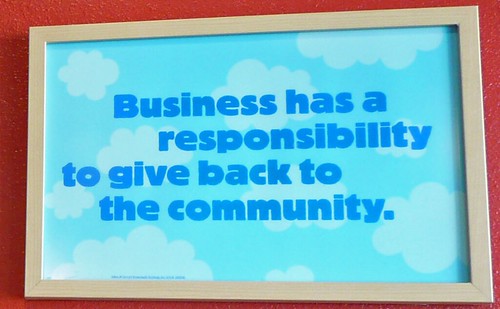
I was asked on Twitter recently where to find a list of links to tech companies’ CSR reports.
I didn’t know where to find one, so I built one and as well as just the links, I also added in a few extra observations I noted about the reports.
[table id=4 /]
As previously reported here, the 2009 SAP Sustainability Report is superb.
Another company in the list worthy of note is BT, whose report, despite the lack of interactivity, is the only other report to hit the GRI A+ rating.
HP’s site has gone heavy on design to the detriment of usability which is unfortunate because some of the content is really good.
After that, almost all of the companies who have a 2009 report published have done a really good job. The exception to this is Microsoft whose 2009 report, while an improvement on previous reports, still has a long way to go to approach a professional CSR Report standard.
Of the companies who have yet to publish their 2009 report, Oracle and Adobe’s 2008 reports are lacklustre attempts, at best. Neither report to GRI standards and both are long on pretty pictures and short on relevant data.
Having said that, at least Oracle and Adobe are producing Sustainability reports.
The three laggards in this list are Google, Amazon and Apple – none of whom are producing sustainability reports at the minute.
In their defence, Google has its Going Green at Google website and Apple has its Apple and the Environment site, both of whom go into considerable detail on each companies initiatives. In Apple’s case, it does go deep into a lot of the data you would normally see in a Sustainability report. Why it refuses to produce a formal report is beyond me.
In contrast, Amazon’s attempt at an Environmental site/page is an embarrassment. If this is the best they can do, honestly, they’d be better off doing nothing.
One issue I noted was that HP, Cisco and Apple [PDF] all report on sourcing 100% renewable power in Ireland. This is not possible for the reasons I outlined in this post.
What other companies should I add to this list? Please feel free to suggest any in the comments and I will update the list.
UPDATES:
Since publishing this, Nokia have brought out their excellent 2009 report and it is now included above.
Also, based on suggestions received on FaceBook I have added details about 3 other companies (NEC, Fujitsu and Indra Sistemas). It was also suggested there that I go over various telco companies CSR reports. I’ll leave that to a separate post.
You should follow me on twitter here.

